(I'm posting this on all of my blogs)
Going through my files, I found this list from my WebTV Webpage. Remember WebTV? It had to be written somewhere around 2000-2002.
Man, I was cocky back then. And sharp. Enjoy.
_____________________________________
So you want to publish your book . . . here's a list of 10 things you ought to do.
1) Sit down and write the book.
That's right. Sit down and write. Lots of writers talk the talk, but they don't walk the walk. They want to live a writer's lifestyle (whatever that is). They are attracted to the writer's celebrity status (whatever they think that is). They are eager to puff their egos by seeing their names on a book jacket on a bookshelf at Barnes and Noble (and yes, that does puff one's ego). They desire to introduce themselves to strangers with a firm handshake and a hearty--"My name is FILLINTHEBLANK, and I am a writer." Cut the crap. Stop posing and get that book written. I have worked with too many clients (when I was editing books) that would hand me six or seven typed pages and say, "Here's where I've gotten so far, Tell me what you think of it." My answer would invariably be: "I think you are a poser. Go write. Come back when this has grown up." Writers write. And publishers publish manuscripts that are longer than six pages. Spend an hour every morning writing two pages. In six months you'll have your first book. It may not be great, but at least it will be finished and we can talk about it.
2) Copyright the book.
Now a few years ago, I would never have wasted your time or mine with this piece of advice. In fact, if you had asked me a question about copyrights back then, I would have told you not to worry about it. "No one is going to steal your book," I would have told you. "If a publisher really likes your writing, they won't steal it. The work is like the golden egg, but you are the goose that lays the egg. If they steal the work, they sell one book. But if they sign you as one of their writers, they can sell a series of your books. That makes more sense." Recent personal events, however, have demonstrated that people do steal a writer's work. Protect yourself. Enough on this.
3) Get another set of eyes to read the book.
Join a writer's group or sign up for a creative writing class at a local college and have someone competent and objective read your book. Listen to their advice on what works and what does not work with your book. As the author, you do not have to take all of their advice, but you should listen to it. This helps you to gauge how an audience will read your book--such information can be valuable when you make later decisions on what to cut and what not to cut. Writing groups and creative writing classes are also good places to help you tighten your prose and fix your grammar and clean up your typos. As writers, we often have a vision of the book in our heads that is quite different from the actual book that is written on the pages. We become blind to our mistakes. Worse yet, our hubris makes us unwilling to cut dull and longwinded passages. So get your book read by an objective reader or two and leave your ego at the door.
4) Find twenty to twenty-five publishers who might be interested in publishing your book.
There are a couple ways of doing this. The first way is to be a good reader. If you are a good reader, then you already have many books on your shelves that are similar to the one you have written. Who published these books? Start writing that list. The second way is to go to a bookstore and pick up books that are similar to yours. Who published these books? You can go online and do the same thing. You can also go to a very important book called the THE NOVEL AND SHORT STORY WRITER'S MARKET and do the same thing. This is your target list.
5) Arrange the target list in order of most prestigious to least prestigious.
When you start sending out your manuscript you will begin with the publishers at the top of the list and work your way down. In the words of author Lynne Barrett told us in grad school, "Your manuscript, like water, will find its own level."
6) Write a MEETS hook.
Think about your book. Think about two other books (or movies) that it is similar to. Then write your MEETS hook. Your MEETS hook should sound something like this: "My novel, CHARITY GARNER'S BOYS is a story of rage, temptation, gangsters, and surprising compassion set in the high plateaus of depression era South Dakota [. . . include a brief description of the book . . . then finish with . . .] It is like BONNIE AND CLYDE meets THE BRIDGES OF MADISON COUNTY.
7) Get an agent.
Once you have tightened up the book, gotten your target list together, and written your MEETS hook, it is time to get an agent. Why do you need an agent? Because you need a friend and guide in the publishing world. Yes, there are writers who have gotten published without agents. They are not the rule--they are lucky. An agent will get 15% commission on your book, and he/she will be worth every penny of that commission. How do you get an agent? There are several ways to do this. Send out query letters to agents listed online or in books such as THE NOVEL AND SHORT STORY WRITER'S MARKET (there are many good books and online sources that will guide you through query-letter writing--do consult them). Ask another writer to introduce you to his/her agent--but expect to be turned down. Writers guard their agents jealously. Go to writer's conferences and take a course with the agent (s), who will read your manuscript and maybe sign you up for representation. Note: It is a good idea to go to writer's conferences regardless. Many authors have gotten their books sold or represented through contacts made at writer's conferences.
8) Beware of agents who charge a fee.
Usually, agents do not charge a fee. Agents take 15% commission on advances and book sales. Think about it: if an agent charged even, say, $25 per manuscript as a reading fee, he/she could make a pretty decent living without ever having to do the hard work of actually selling a book. There are a few, very few, big name New York agents that charge a small fee--if you get a chance to work with one of these, pay the fee by all means! Beware of agents who solicit you--most reputable agents have more clients than they can handle. If an agent contacts you via phone, letter, or email, ask for a list of published clients. There are many writers out there eager to get into print and they are easy prey for predators posing as agents and editors.
9) Help your agent to sell your book.
Once you have gotten your agent, give her/him your plan for selling your book: the target list of publishers, your MEETS hook. The agent will likely modify the target list based on her/his contacts in the publishing world. The agent may also modify your MEETS a bit. The agent will also want to know what audience you wrote the book for: age, race, gender, level of education. You should be able to answer all of these questions. It is also likely that the agent, upon signing you up, already has a few publishers in mind for your book, publishers that he/she has worked with in the past and who are looking for a book such as yours. If this is the case, you have hit the jackpot. Just sit on your hands, and let your agent do his/her job.
10) If All Else Fails . . .
Should I self-publish? Maybe--but hold on there a minute. Did you join a writer's group? Did you leave your ego at the door? Did you edit and then really edit your book? Did you go to a writer's conference and hobnob with agents and publishers? Maybe you should enter your book in a few contests. Try that. If all else has failed, then maybe you should self-publish. Self-publishing is not a bad idea if you are the right kind of person. I hope to build another link in a month or two that addresses the issue of self-publishing with a greater thoroughness. For now, let me leave with you with a few tips. 1) Get a company that is inexpensive. The self-publishing companies that charge $5000 provide roughly the same quality service as the ones that are $750, $450, $250, or free. 2) Make sure your book is copyrighted. 3) Don't purchase any of their add-on services. They are a waste of time and if you need them, you can always get them cheaper at Office Depot. 4) If you plan to get rich on the book, prepare to have a professional marketing plan; in fact, you need to hire a professional publicist. This will cost you money, but it will be worth it. 5) Be prepared to travel to sell your book. 6) Be prepared to make deals with bookstore managers to stock your books. 7) Be prepared to work.
I have more to say on this, and I will on a new link.
Good luck
--Preston
A blog for lovers of the printed word (novels, short stories, poems--the Ing so to speak), popular film, politics, and casinos (the Bling).
Monday, September 23, 2013
Subscribe to:
Post Comments (Atom)
Lipshitz 6

Reading T Cooper for Christmas
Click Here to Purchase Lipshitz 6
Punk Blood

Jay Marvin
Click Here to Purchase Punk Blood
Breath, Eyes, Memory

Anonymous Rex
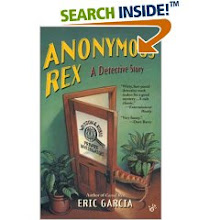
Reading Eric Garcia for Christmas
Click Here to Purchase Anonymous Rex
Vinegar Hill
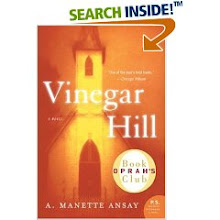
Reading A. Manette Ansay for Christmas
Click Here to Purchase Vinegar Hill
Nicotine Dreams

Reading Katie Cunningham for Christmas
Click Here to Purchase Nicotine Dreams
Junot Diaz
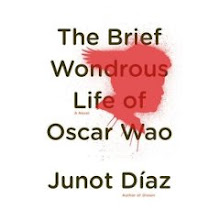
Pulitzer Prize Winner!!!
Click Here to Purchase The Brief Wondrous Life of Oscar Wao
Edwige Danticat

New Year's Reading
Click Here to Purchase Brother I"m Dying
Greed
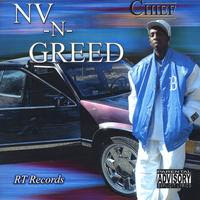
This Brother Is Scary Good
Sweet Music
One More Chance
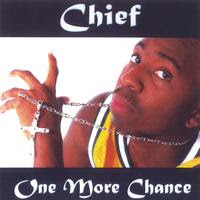
The genius Is At It Again/The Rapper CHIEF aka Sherwin Allen
Sandrine's Letter
Check out Sandrine's Letter To Tomorrow. You will like it, I insist.
Sandrine's Link
Cool Sites
- Akashic Books
- All or Nothing (My Other Blog)
- Asili The Journal
- Best Gamblling News Site
- Black Star Review
- Book Remarks
- Booktour.com
- Carolina Wren Press
- Click Here for Some Pretty Good Writing Contests
- Dedra Johnson
- Enrico Theoc
- Felicia Luna Lemus
- Florida Book Review
- Foreword Magazine
- Gambling Is Linked to Suicide
- Gambling Is Not Linked to Suicide
- Gaming Law Review
- Gene Durnell's The Thinking Journalist
- Gene Durnell's The Thinking Journalist
- Geoffrey Philp's Blog
- Get Chief's CDs on CD Baby
- Getting Past Gambling
- Gonzalo Barr's Blog
- Good Reads
- Hallema's Homepage
- Help With Gambling Addiction
- Jeremy Shipp's Website
- John Dufresne's Blog
- Leonard Nash Homepage
- Links to Seminole Casinos in Florida
- Martha Frankel's Homepage
- Michael A. Gonzales
- Miss Snark/ An Agent Gives Great Publishing Advice
- More Addiction Help
- No Gambling.com
- Pat MacEnulty
- ScrewIowa.com
- St. Louis Rams, The Greatest Show on Turf
- Suicide reference library
- T Cooper
- University of Florida
- Vicki Hendricks
- Walter Jacobs's Blog
- Writers Who Read
- Writing with Celia

All or Nothing

Editorial Reviews of All or Nothing
New York Times--". . . a cartographer of autodegradation . . . Like Dostoyevsky, Allen colorfully evokes the gambling milieu — the chained (mis)fortunes of the players, their vanities and grotesqueries, their quasi-philosophical ruminations on chance. Like Burroughs, he is a dispassionate chronicler of the addict’s daily ritual, neither glorifying nor vilifying the matter at hand."
Florida Book Review--". . . Allen examines the flaming abyss compulsive gambling burns in its victims’ guts, self-esteem and bank accounts, the desperate, myopic immediacy it incites, the self-destructive need it feeds on, the families and relationships it destroys. For with gamblers, it really is all or nothing. Usually nothing. Take it from a reviewer who’s been there. Allen is right on the money here."
Foreword Magazine--"Not shame, not assault, not even murder is enough reason to stop. Allen’s second novel, All or Nothing, is funny, relentless, haunting, and highly readable. P’s inner dialogues illuminate the grubby tragedy of addiction, and his actions speak for the train wreck that is gambling."
Library Journal--"Told without preaching or moralizing, the facts of P's life express volumes on the destructive power of gambling. This is strongly recommended and deserves a wide audience; an excellent choice for book discussion groups."—Lisa Rohrbaugh, East Palestine Memorial P.L., OH
LEXIS-NEXIS--"By day, P drives a school bus in Miami. But his vocation? He's a gambler who craves every opportunity to steal a few hours to play the numbers, the lottery, at the Indian casinos. Allen has a narrative voice as compelling as feeding the slots is to P." Betsy Willeford is a Miami-based freelance book reviewer. November 4, 2007
Publisher’s Weekly--"Allen’s dark and insightful novel depicts narrator P’s sobering descent into his gambling addiction . . . The well-written novel takes the reader on a chaotic ride as P chases, finds and loses fast, easy money. Allen (Churchboys and Other Sinners) reveals how addiction annihilates its victims and shows that winning isn’t always so different from losing."
Kirkus Review--"We gamble to gamble. We play to play. We don't play to win." Right there, P, desperado narrator of this crash-'n'-burn novella, sums up the madness. A black man in Miami, P has graduated from youthful nonchalance (a '79 Buick Electra 225) to married-with-a-kid pseudo-stability, driving a school bus in the shadow of the Biltmore. He lives large enough to afford two wide-screen TVs, but the wife wants more. Or so he rationalizes, as he hits the open-all-night Indian casinos, "controlling" his jones with a daily ATM maximum of $1,000. Low enough to rob the family piggy bank for slot-machine fodder, he sinks yet further, praying that his allergic 11-year-old eat forbidden strawberries—which will send him into a coma, from which he'll emerge with the winning formula for Cash 3 (the kid's supposedly psychic when he's sick). All street smarts and inside skinny, the book gives readers a contact high that zooms to full rush when P scores $160,000 on one lucky machine ("God is the God of Ping-ping," he exults, as the coins flood out). The loot's enough to make the small-timer turn pro, as he heads, flush, to Vegas to cash in. But in Sin City, karmic payback awaits. Swanky hookers, underworld "professors" deeply schooled in sure-fire systems to beat the house, manic trips to the CashMyCheck store for funds to fuel the ferocious need—Allen's brilliant at conveying the hothouse atmosphere of hell-bent gaming. Fun time in the Inferno.
Florida Book Review--". . . Allen examines the flaming abyss compulsive gambling burns in its victims’ guts, self-esteem and bank accounts, the desperate, myopic immediacy it incites, the self-destructive need it feeds on, the families and relationships it destroys. For with gamblers, it really is all or nothing. Usually nothing. Take it from a reviewer who’s been there. Allen is right on the money here."
Foreword Magazine--"Not shame, not assault, not even murder is enough reason to stop. Allen’s second novel, All or Nothing, is funny, relentless, haunting, and highly readable. P’s inner dialogues illuminate the grubby tragedy of addiction, and his actions speak for the train wreck that is gambling."
Library Journal--"Told without preaching or moralizing, the facts of P's life express volumes on the destructive power of gambling. This is strongly recommended and deserves a wide audience; an excellent choice for book discussion groups."—Lisa Rohrbaugh, East Palestine Memorial P.L., OH
LEXIS-NEXIS--"By day, P drives a school bus in Miami. But his vocation? He's a gambler who craves every opportunity to steal a few hours to play the numbers, the lottery, at the Indian casinos. Allen has a narrative voice as compelling as feeding the slots is to P." Betsy Willeford is a Miami-based freelance book reviewer. November 4, 2007
Publisher’s Weekly--"Allen’s dark and insightful novel depicts narrator P’s sobering descent into his gambling addiction . . . The well-written novel takes the reader on a chaotic ride as P chases, finds and loses fast, easy money. Allen (Churchboys and Other Sinners) reveals how addiction annihilates its victims and shows that winning isn’t always so different from losing."
Kirkus Review--"We gamble to gamble. We play to play. We don't play to win." Right there, P, desperado narrator of this crash-'n'-burn novella, sums up the madness. A black man in Miami, P has graduated from youthful nonchalance (a '79 Buick Electra 225) to married-with-a-kid pseudo-stability, driving a school bus in the shadow of the Biltmore. He lives large enough to afford two wide-screen TVs, but the wife wants more. Or so he rationalizes, as he hits the open-all-night Indian casinos, "controlling" his jones with a daily ATM maximum of $1,000. Low enough to rob the family piggy bank for slot-machine fodder, he sinks yet further, praying that his allergic 11-year-old eat forbidden strawberries—which will send him into a coma, from which he'll emerge with the winning formula for Cash 3 (the kid's supposedly psychic when he's sick). All street smarts and inside skinny, the book gives readers a contact high that zooms to full rush when P scores $160,000 on one lucky machine ("God is the God of Ping-ping," he exults, as the coins flood out). The loot's enough to make the small-timer turn pro, as he heads, flush, to Vegas to cash in. But in Sin City, karmic payback awaits. Swanky hookers, underworld "professors" deeply schooled in sure-fire systems to beat the house, manic trips to the CashMyCheck store for funds to fuel the ferocious need—Allen's brilliant at conveying the hothouse atmosphere of hell-bent gaming. Fun time in the Inferno.
At Books and Books
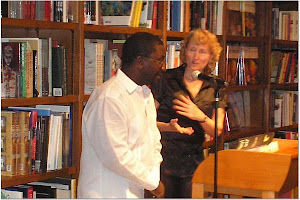
Me And Vicki at Our Reading
Bio
Preston L. Allen is the recipient of a State of Florida Individual Artist Fellowship in Literature and the Sonja H. Stone Prize in Fiction for his short story collection Churchboys and Other Sinners (Carolina Wren Press 2003). His works have appeared in numerous publications including The Seattle Review, The Crab Orchard Review, Asili, Drum Voices, and Gulfstream Magazine; and he has been anthologized in Here We Are: An Anthology of South Florida Writers, Brown Sugar: A Collection of Erotic Black Fiction, Miami Noir, and the forthcoming Las Vegas Noir. His fourth novel, All Or Nothing, chronicles the life of a small-time gambler who finally hits it big. Preston Allen teaches English and Creative Writing in Miami, Florida.
No comments:
Post a Comment